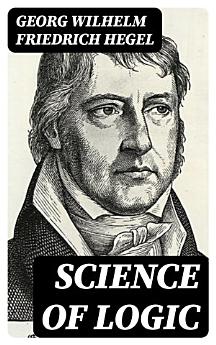Science of Logic
Georg Wilhelm Friedrich Hegel
नव॰ 2022 · DigiCat
ई-बुक
310
पेज
family_home
योग्य
info
reportरेटिंग और समीक्षाओं की पुष्टि नहीं हुई है ज़्यादा जानें
इस ई-बुक के बारे में जानकारी
Georg Wilhelm Friedrich Hegel's "Science of Logic" is a profound exploration of the nature and development of logic as a dialectical process. Written in the early 19th century, the text reflects Hegel's philosophical project to reconcile ideas of contradiction and unity, where he meticulously dissects traditional logical structures. Employing a dense, yet methodical style, Hegel transforms logic from a mere tool for scientific inquiry into an organic system that captures the dynamic and evolving nature of reality itself. Notably, the work offers a systematic account of concepts such as being, essence, and notion, thus situating itself within the broader context of German Idealism. Hegel, a pivotal figure in Western philosophy, was deeply influenced by the tumultuous socio-political landscape of his time, particularly the aftermath of the French Revolution. His engagement with metaphysics and epistemology paved the way for this foundational work, as Hegel sought to articulate a comprehensive framework that accounted for human thought and its evolution in the face of historical development. His intellectual environment, steeped in Enlightenment ideals yet marked by emerging contradictions, directly shaped the themes present in "Science of Logic." This seminal work is recommended for readers keen on understanding the intricacies of Hegelian thought and its enduring impact on contemporary philosophy. With its ambitious scope and innovative treatment of logic, "Science of Logic" challenges readers to reconsider the relationship between thought and reality, making it an essential read for students of philosophy, logic, and even the social sciences.
लेखक के बारे में
Georg Wilhelm Friedrich Hegel (1770–1831) was a profound German philosopher, who is best recognized for his significant contributions to the realms of metaphysics, epistemology, political philosophy, ethics, and aesthetics. A central figure in German Idealism, he developed a comprehensive philosophical framework, or 'system,' which he envisioned as unveiling the structure of reality itself. Hegel's philosophy is encapsulated in his dialectical method, an approach that suggests that history progresses through a series of contradictions and their resolutions, ultimately leading to a form of absolute knowledge. One of Hegel's most notable works is the 'Science of Logic' ('Wissenschaft der Logik'), published in three volumes between 1812 and 1816. This formidable text is a cornerstone of his intellectual edifice and illustrates his revolutionary take on the principles of logic and the nature of thought. Here, Hegel argues that the true structure of thought resides in dialectical reasoning, rather than in the formal logic of his predecessors. His emphasis on the processual nature of reality and thought, and the unity of content and form, exemplifies his method and profoundly influenced subsequent philosophical traditions such as Marxism, existentialism, and various strains of contemporary thought. Hegel's style, dense and challenging, continues to provide fertile ground for scholars and students of philosophy.
इस ई-बुक को रेटिंग दें
हमें अपनी राय बताएं.
पठन जानकारी
स्मार्टफ़ोन और टैबलेट
Android और iPad/iPhone के लिए Google Play किताबें ऐप्लिकेशन इंस्टॉल करें. यह आपके खाते के साथ अपने आप सिंक हो जाता है और आपको कहीं भी ऑनलाइन या ऑफ़लाइन पढ़ने की सुविधा देता है.
लैपटॉप और कंप्यूटर
आप अपने कंप्यूटर के वेब ब्राउज़र का उपयोग करके Google Play पर खरीदी गई ऑडियो किताबें सुन सकते हैं.
eReaders और अन्य डिवाइस
Kobo ई-रीडर जैसी ई-इंक डिवाइसों पर कुछ पढ़ने के लिए, आपको फ़ाइल डाउनलोड करके उसे अपने डिवाइस पर ट्रांसफ़र करना होगा. ई-रीडर पर काम करने वाली फ़ाइलों को ई-रीडर पर ट्रांसफ़र करने के लिए, सहायता केंद्र के निर्देशों का पालन करें.








